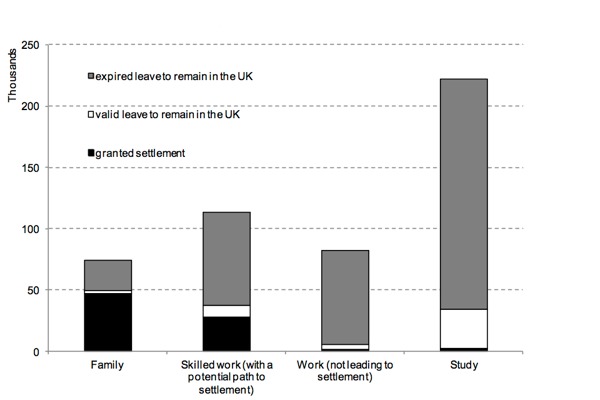- BY Colin Yeo

The migrant journey in the UK
THANKS FOR READING
Older content is locked

A great deal of time and effort goes into producing the information on Free Movement, become a member of Free Movement to get unlimited access to all articles, and much, much more
TAKE FREE MOVEMENT FURTHER
By becoming a member of Free Movement, you not only support the hard-work that goes into maintaining the website, but get access to premium features;
- Single login for personal use
- FREE downloads of Free Movement ebooks
- Access to all Free Movement blog content
- Access to all our online training materials
- Access to our busy forums
- Downloadable CPD certificates
The fourth part in the Migrant Journey research series was recently released by the Home Office. It examines what happened to non EEA migrants who entered the UK by various lawful means in 2007. A few random snippets of facts I thought were interesting:

- Only 34% of those who entered with skilled worker visas in 2007 with a potential for settlement were still lawfully present in the UK five years later. It looks like most had departed again. I can’t imagine many would have stayed unlawfully.
- Only 67% of those who entered with family visas leading to settlement were still lawfully present after five years. I would have expected this number to be higher but it looks like a lot of people leave again. The figures for Bangladeshis were as high as 92% being lawfully present after five years compared to 30% for US citizens. The Home Office stereotype risk profile would suggest Bangladeshis are more likely to overstay but that does not seem to be the case at all. Interestingly, compared to previous years the 2007 family visa cohort were more likely to be settled or be lawfully present after five years than cohorts for previous years. This figure for the 2004 cohort was only 60%.
- 15% of students entering in 2007 were still lawfully present after five years and only a tiny number were settled.
- The ‘backward view’ analysis (looking at settlement grants in various years then working back) reveals fluctuation in the percentage of settlers who originally entered on a route to settlement: 53% for cases in 2009, 42% in 2010, 48% in 2011 and 53% in 2012. Of migrants granted settlement in 2012, 29% had originally entered the UK on a skilled work route, while 25% were granted settlement having arrived in the family route. A further 12% went straight to settlement, many of whom would presumably therefore have been family members granted Indefinite Leave to Enter on arrival.
Unfortunately, I cannot imagine this very interesting research series being taken into account in any way in policy making. Evidence based policy remains a pipe dream under this Government, perhaps even more so in immigration than in other areas of policy.
SHARE


2 responses
Please support and promote our simple but brilliant campaign to counteract all the negative images of UK immigration – a day of (in)action to celebrate St George The Immigrant. https://www.facebook.com/events/345128585623585/ Spread the word, share, tweet, invite your friends
Figures for visitor visas? Or were they not included because not “migration”… of the overstayers I meet, most came on visitor visas.